.
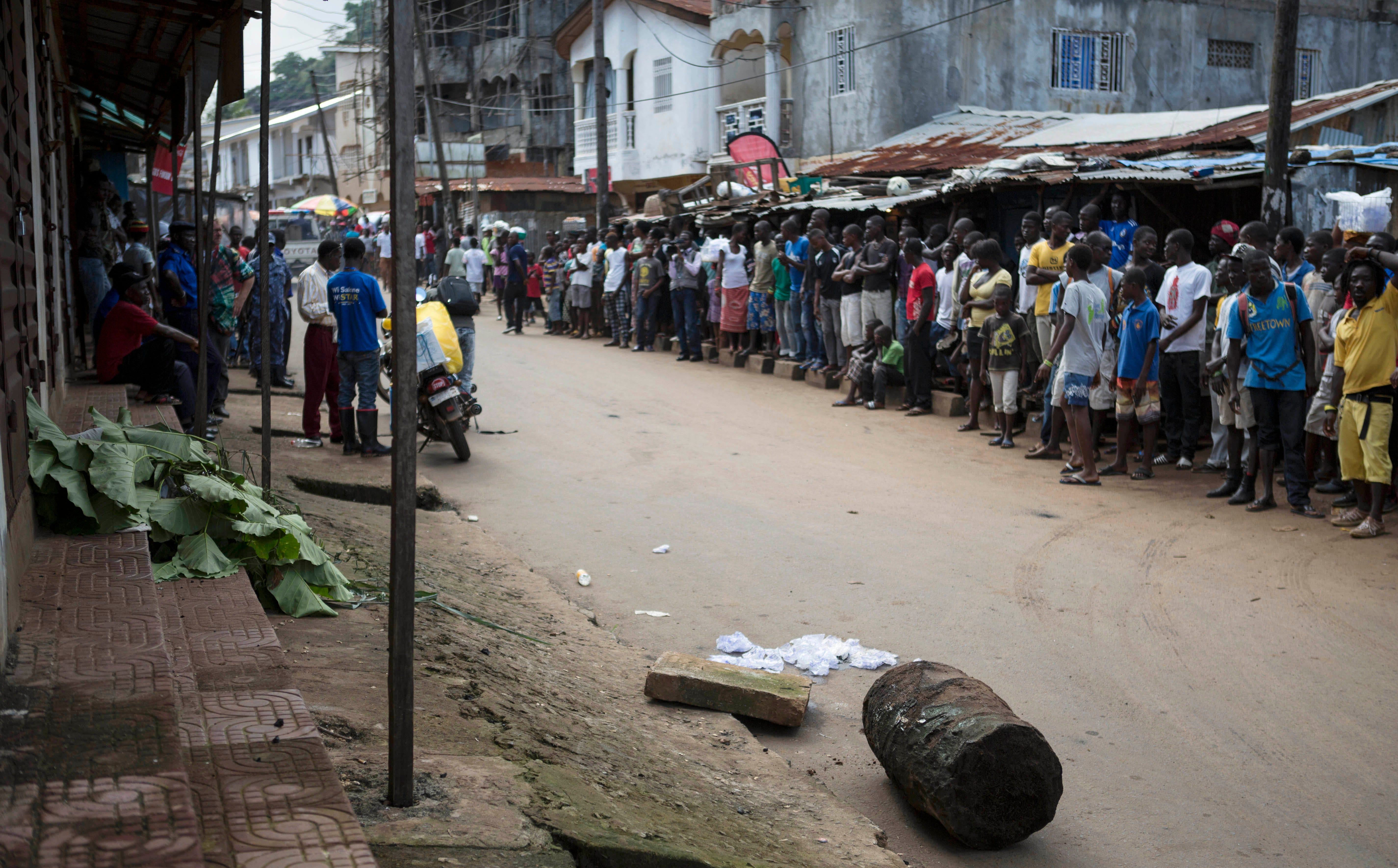
People
gather around the body of a person suspected to have died from the Ebola virus,
covered in leaves as it lies on the street in Freetown, Sierra Leone: photo by Tanya Bindra / Associated Press via Business Insider, 17 October 2014

Execution, Mexico City: photo by Jair Cabrera Torres (rastamaniaco), 8 March 2014

Life is amazing (Mexico City): photo by Jair Cabrera Torres (rastamaniaco), 7 March 2014

Murder victim, Mexico City: photo by Jair Cabrera Torres (rastamaniaco), 26 March 2014

Execution victim, Valle de Chalco: photo by Jair Cabrera Torres (rastamaniaco), 10 March 2014

Execution victim, Tlalnepantla: photo by Jair Cabrera Torres (rastamaniaco), 6 March 2014

Murder victim, Iztapalapa: photo by Jair Cabrera Torres (rastamaniaco), 18 July 2013

The world's most wanted drug kingpin, Joaquin Loera Guzman, known as El Chapo, is captured, Mexico City: photo by Jair Cabrera Torres (rastamaniaco), 22 February 2014

Accident scene, Iztapalapa: photo by Jair Cabrera Torres (rastamaniaco), 26 September 2013

Accident scene, Mexico City: photo by Jair Cabrera Torres (rastamaniaco), 17 July 2013
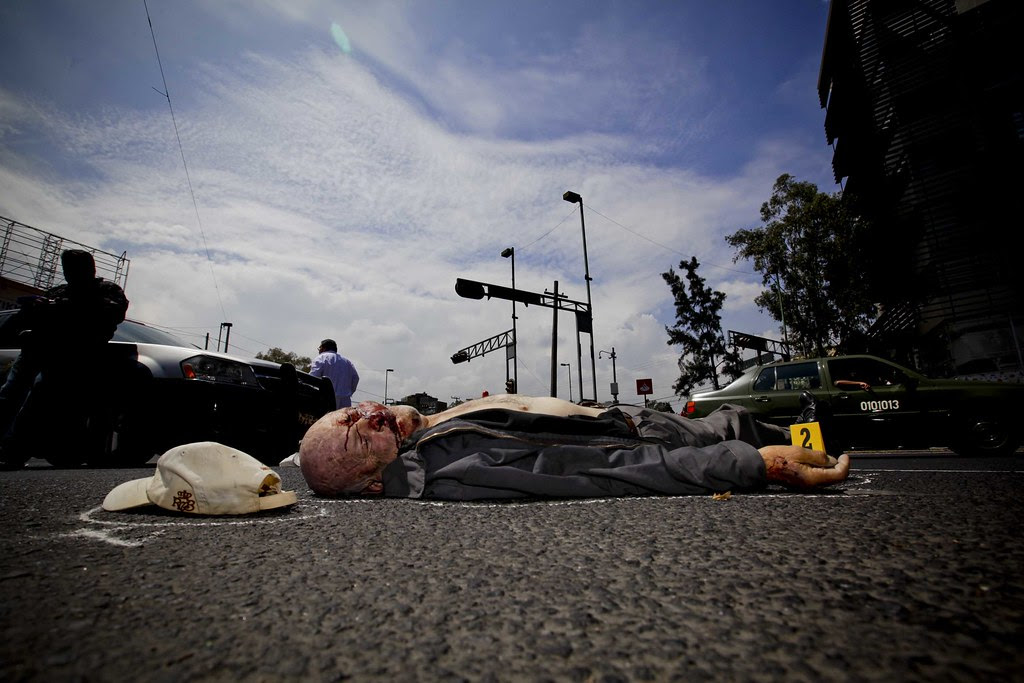
Fatal accident scene, Mexico City: photo by Jair Cabrera Torres (rastamaniaco), 11 October 2013
Struggle to fight #Ebola: people in #SierraLeone slums very poor w/ little access to clean water & sanitation: image via Helen Clark @HelenClark_UNDP, 11 October 2014

Challenges of poverty #EbolaResponse in #Freetown slums. Hygiene food, water, @UNDP fights on all fronts: image via Mila Rosenthal @RosenthalMila, 11 October 2014
Could saving West Africa's forests have prevented #Ebola? Industrial kimberlite diamond pit
mine in Sierra Leone, West Africa owned by Koidu holdings, one of a
number of international mining companies who have come to Sierra Leone
in search of diamonds. Mining is among major factors driving
deforestation of the region.
The result: virus, bats and people have had more opportunities to meet: photo by David Levene for the Guardian via World Economic Forum @wef, 10 October 2014
Here's What It's Like To Live In An African City Plagued By Ebola...#Freetown: photo by Michael Duff / AP via Booyah!! @kijanafulani, 19 October 2014
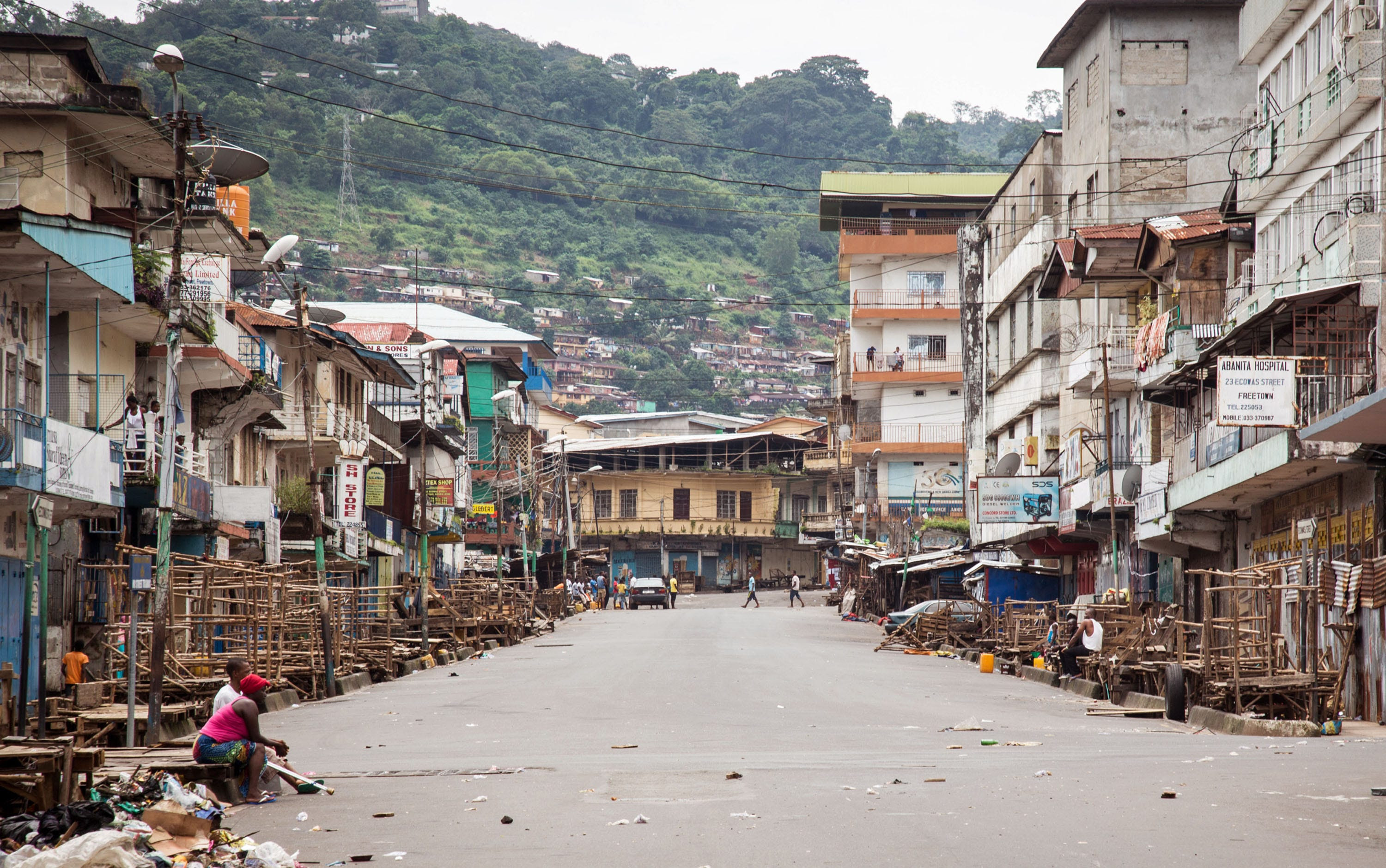
A few people are seen during a three-day lockdown to prevent the spread of the Ebola virus, in Freetown, Sierra Leone: photo by Michael Duff / AP via Business Insider, 17 October 2014
Sierra Leone is a very friendly, very sociable place but that is
changing. People are living by the ABC rule: Avoid Bodily Contact.
Nobody shakes hands or touches anymore. There is definitely a different
atmosphere. It’s a lot quieter. People are definitely changing their
behaviour.
Business Insider, 17 October 2014

#Ebola safe burial team working to remove & inter dead bodies of ppl suspected to have died of Ebola in #Sierra Leone: image via WHO @WHO, 7 October 2014

#Ebola safe burial team working to remove & inter dead bodies of ppl suspected to have died of Ebola in #Sierra Leone: image via WHO @WHO, 7 October 2014

#Ebola safe burial team working to remove & inter dead bodies of ppl suspected to have died of Ebola in #Sierra Leone: image via WHO @WHO, 7 October 2014

#Ebola safe burial team working to remove & inter dead bodies of ppl suspected to have died of Ebola in #Sierra Leone: image via WHO @WHO, 7 October 2014
#EbolaSL The only #Ebola cemetery at #Tokpombu (for #Kenema district) is full: image via Cédric Moro @Moro_Cedric, 9 October 2014

Freetown, Sierra Leone. Volunteers arrive to pick up bodies. They get $100 a week as compensation for their high-risk work: photo by Florian Plaucheur / AFP via The Guardian, 10 October 2014
Anger in Sierra Leone after body of #Ebola victim left on street for two days: image by Reuters via BBC News (World) @BBCWorld, 15 October 2014

Residents
watch as health workers, not in picture, take samples from the body of a
person suspected of dying from the Ebola virus as it lies on the street
covered in leaves in Freetown, Sierra Leone: photo by Tanya Bindra / Associated Press via Business Insider, 17 October 2014
#ebola graves: unmarked in cleared forest. Whole families. No-one to mourn them. Heartbreaking. #Sierra Leone: image via DrJavid Abdel @thisfoolj, 7 October 2014




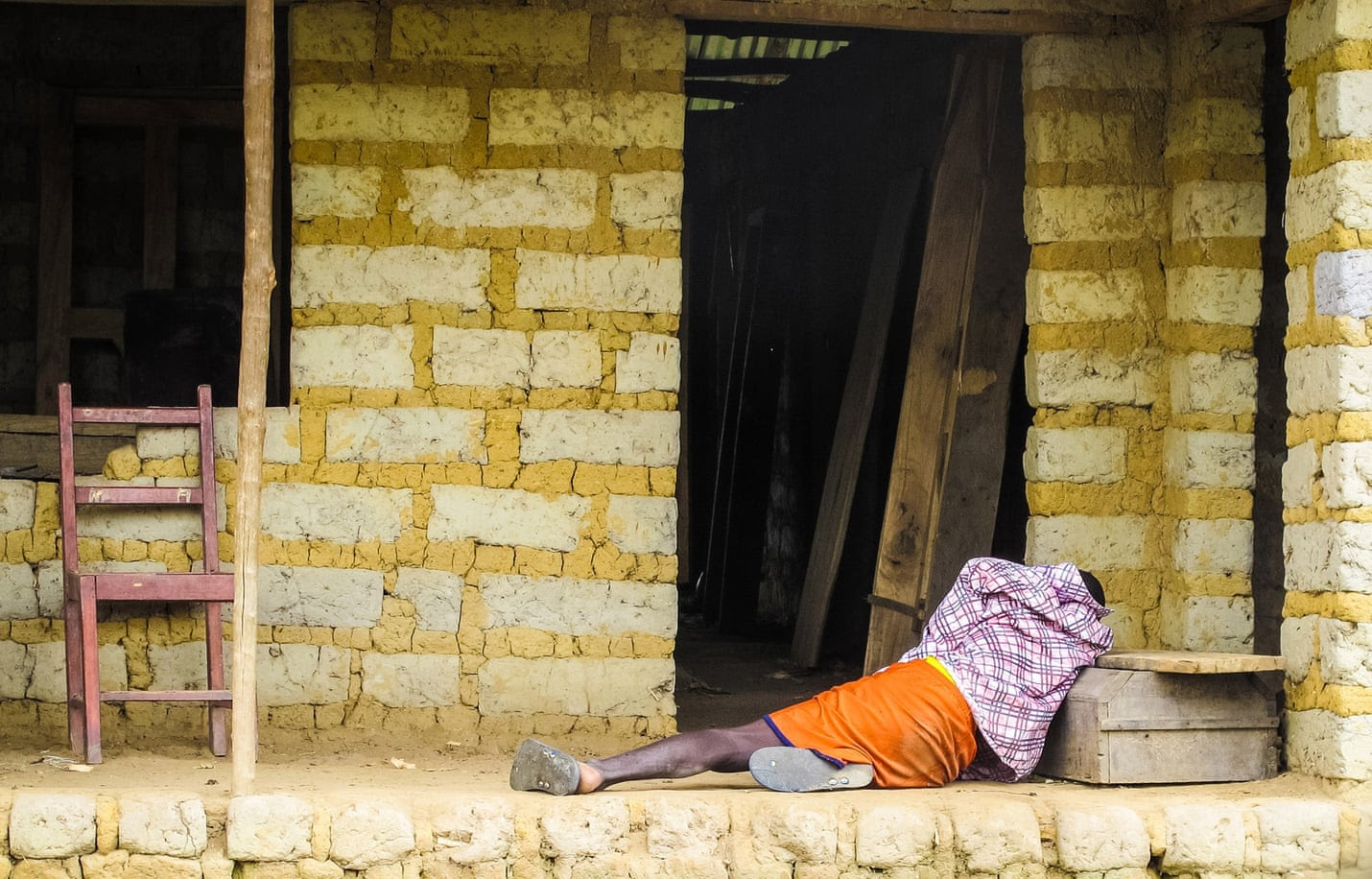
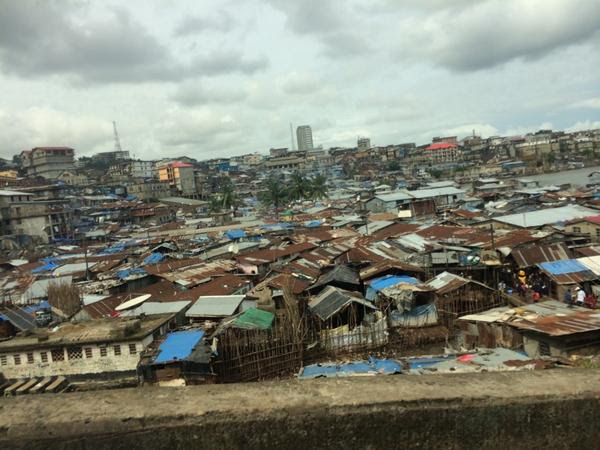


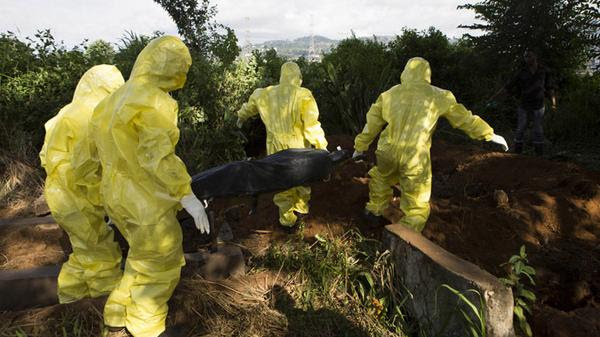





Even in the postmodern administered authoritarian global coprosperity sphere there were always going to be gaps in the binding; order is not an automatic function of artificial organic systems, like social "bodies".
ReplyDeleteConsider for example what happens in the eighth minute here, when, for that one minute when a fine point is being put on it, the entire concept of social control is put into question.
Tom,
ReplyDeleteIn the days when I was working for one of them corporate abattoirs, a colleague who was deputizing in Mexico City, was stripped and robbed in the middle of the street. The firm commanded the man to swear secrecy over the affair as they did not want to be associated with part-negligence in security and safety of their employee, on behalf of a company flying corporate labour from far off continents to bridge the "service" gap - on a daily basis. A very personal, and rather more aggressive form of ABC right there. The coprosperity sphere that you mention here might lie still to give us the impression of reach, but points to one definite direction. That colleague by the way returned within a week and quit his job. So much for naked truths.
Brilliant. Considering that first photo, Malvina Reynolds singing “Boxes, little boxes . . .” seems appropriate. In death as in life.
ReplyDeleteWhen biologist Ernst Mayr was asked if there might be intelligent life elsewhere in the universe, he answered—no. And then he added, there won’t be any here for much longer, because higher intelligence in mammals has proved to be “a lethal mutation.” It’s an evolutionary misstep. The deadliest virus is the human virus.
Sierra Leone's fight against Ebola infection: "The world is not safe": Guardian, 30 October 2014
ReplyDeleteIn the foothills enveloping Freetown, Major Henry Bangura has also been redeployed. His team converted an old police training camp into a 100-bed Ebola treatment centre in three days last month during a three-day lockdown.
In the city centre, British doctor Oliver Johnson, who has worked in the Connaught hospital for two years, tells of similar heroic work. In an attempt to keep the hospital open for general care, he and his team converted the triage in the Connaught hospital into a 16-bed isolation unit in just five hours.
But the tireless work of those living in Sierra Leone is not proving enough to catch the disease whose victims easily outpace the number of beds being built.
Between fielding calls in another hectic day at the Connaught, Johnson says a change in mentality is needed to bridge the chasm between grand plans hatched in Washington, New York and London and the urgent needs on the ground.
He says he is impressed with the “joined up thinking of British government” efforts with a 100-bed facility due to open in the suburb of Kerry Town and five more hospitals scheduled to open before the end of November.
But while locals can convert buildings within days, the British hospitals are taking two months to build and there is scepticism that the remaining facilities will be built in four weeks. “Time is against us. Kerry Town is part of the solution but it’s not going to be enough any more,” says Johnson. “We’ve moved from one or two cases a day to more than 30 cases a day in Freetown, and by next month maybe we will be getting 60, 70, 80 positive cases a day, so that 100-bed unit in Kerry Town will be full in 48 hours,” he says.
In the new command centre in Freetown there is a sense that the management, at least, of the epidemic in the capital is under control. Burials are being completed within 24 hours. But there is little to celebrate.
The large whiteboards charting dozens of live cases show why the infection rate is out of control. Patient number two is 38-years-old. Status: “Weak, 8 people in the home”. That’s eight people who now needed to be quarantined. Next is an 18-year-old. Status: “28 weeks pregnant. Epilink (husband, sister-in-law, brother dead”. Then there’s a 12-year-old girl. Status: “Can walk. 4 in house”. Ebola is indiscriminate. Last on the list is a one-year-old Ebola suspect. She is from a quarantined home with eight in the house.
[continues]
ReplyDeleteIn the district of Port Loko up the coast there are reports of people dying on verandahs and corpses rotting in homes. One woman lies dead on the floor of a hospital after a struggle to give birth. There are no labs, isolation or treatment units in the district. The Cuban doctors who had been due to work in a new clinic in Port Loko sit frustrated in a Freetown hotel after the NGO assigned to manage the facility pulled out.
If the World Health Organisation’s worst projections come to pass, Sierra Leone needs up to 4,800 beds by the end of November to contain the outbreak. Even with the 700 beds promised by the British, the capacity will not be reached.
“There’s no way that by the end of November we are going to be where we need to be unless we start parachuting in ready-made treatment centres in containers,” says Sinead Walsh, the Irish ambassador and a senior development expert who has thrown all her office’s weight into the Ebola fight.
Johnson and others, including Stephen Gaojia, the coordinator for the national Ebola response, are advocating a mass and immediate programme of upgrading existing health facilities rather than wait months for international standard hospitals to be built by outsiders.
“I would rather have 40 NHS volunteers on the frontline fighting this outbreak today than 400 in January when it may be too late,” says Johnson. What is needed is a different strategy with dozens of small 10- to 15-bed units which can be run by international experts.
But red tape, growing hysteria in the US and the UK over volunteering, and the attitude of some international NGOs mean resources are not being deployed quickly enough. NHS volunteers have yet to arrive and Johnson questions whether any will be permitted to work in the local facilities he is advising the Sierra Leonean government on.
“I think we’ve got to move our mentality from saying ‘let’s provide the best possible building, that is the dream scenario’. All we need is a room, with some buckets of chlorine and a burns pit outside and a fence around it, and something that is pretty basic, but that is safe and effective.”
He says NGO experts flying in with their sometimes “patronising” ideas for a rotation of one month and flying out again doesn’t help. “I’ve been at meetings, where I’ve just been a bit embarrassed at some of the NGOs that have been there who are shouting at this guy at the ministry. He’s a one-man directorate who has not stopped working for six months, who doesn’t have internet, who doesn’t have a driver and has been absolutely been on the frontline for six months,” says Johnson.
Gaojia says it has been a challenge to get experienced clinicians from overseas, but he is hoping solidarity from his African neighbours will lead to an influx of experts from places like Uganda which have already experienced Ebola. “As long as Ebola remains in any country, I don’t think the world is safe,” he said. “The longer it continues in this country, the worse it gets for the rest of the world.”
But there are no celebrations. Achievements in the burials team are a step in the right direction, but will come to nothing unless the chain of transmission can be broken.
Hazen, whose memory obviously goes back to an earlier geological epoch (1962), was put in mind of the same song I was, looking at that top photo.
ReplyDeleteThe concept of the "cube hotel", somewhat ahead of its time.
I picked Pete Seeger's version for the pictures.
Fifth commentator jumped the gun on us here: "Little boxes: lives in small coffins".
Pete Seeger covers Malvina Reynolds' "Little Boxes"
Manik, it's probably a toss-up as to whether multinational corporations or crime syndicates pose a greater danger to public welfare in Mexico (or anywhere else, for that matter).
Fortunately for the uppety Don't-quarantine-me MSF nurse from Maine, who insists on going for bike rides with her boyfriend even as the state cops dispatched by the Republican governor trail at a safe distance behind, there is not yet a statute in place to deport her to Mexico and lock her up in a confined space with a flock of tarantulas and the lard-ass hothead governor of New Jersey (which likely has as many mafiosi per capita as Mexico City, but never mind... he can always use the exposure).
Well, credit where due, make that the third commenter on Pete's cover of Malvina's song: José Manuel Vasconcelos Esteves, to be precise.
ReplyDeleteAnd about the crying need for isolation quarters in SL... it's been bothering my restless thinking unit for some nights now, what with the current incredible redundancy in "hardened" military vehicles -- specifically those humongous metal-wrapped nuclear-weapon-proof APCs we saw all too much of in Ferguson (humane, civilized crowd control, right), and which are now being doled out like politician-candy to every podunk police force and school district in this dreadfully overpoliced, overmilitarized land... as even the school districts and cop shops, some of them, are proving a bit wary of the attendant problems in owning those mechanized monsters of spectacular overkill (I mean, what good are they, really? Here, one of those freebie million-dollar govt hand-me-down Mechano-Monsters was "employed" -- !! -- sweeping garbage after a local street fair, adding a special tone of menace to a mere saccharine commercial affair for bored white suburbanites)... what about offloading them to Sierra Leone, where medical workers might be able to efface / overwrite the imperial logos and trigger mechanisms, and turn them into mobile hospital wards for Ebola victims?
ReplyDeleteI mean, Chris Christie might not like it, but...